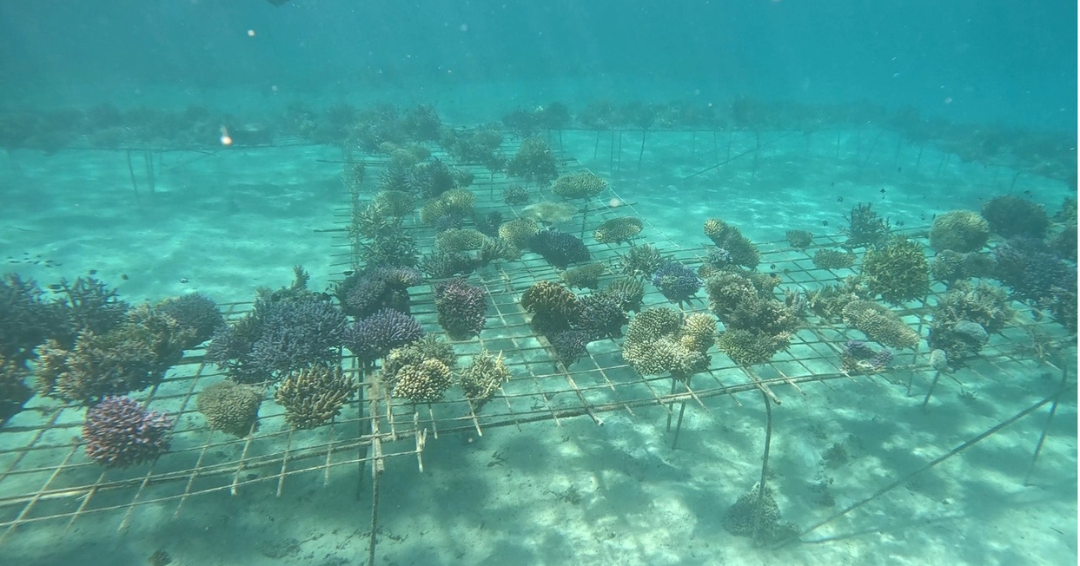Project title: Reefs of Hope: Nature-based Assisted Coral Adaptation
Project lead: Dr. Austin Bowden-Kerby
Co-applicants: Prof. Daniel Barshis, Spencer Miller, Robin JL Hartley, Prof. Madeleine van Oppen, Annelise McDougall, Willy Missack, Stephanie Stephens, Tavita Faletoese, Laisani Waqairaidovu, Gail Riches, Susana Vulawalu, Dr. Douglas Fenner, Leona Kustra
Countries involved: Fiji, USA, New Zealand, Australia, Papua New Guinea, Samoa, Kiribati, Vanuatu, Canada
Takes place: Fiji, Samoa, and Vanuatu
Supporting institutions: Corals for Conservation, Old Dominion University, Settide LLC, Australian Institute of Marine Science, Kyeema Foundation, Vanuatu Climate Action Network (VCAN), Samoa Reefs of Hope, Marine Education, Coral Conservation Society
Total budget: USD $1,499,740
Duration: 36 months
Project overview
Coral reefs face an existential threat from climate change, which has now overtaken pollution, overfishing, and coastal development as their primary driver of decline. Studies at the front-line of collapse indicate that some coral populations, found within hot reef areas, can survive temperatures between 33-36°C. However, these heat-adapted corals remain vulnerable to severe marine heat waves, as temperatures within heat-stressed environments can become lethal (>38°C). To survive a warmer ocean, corals must adapt to rapidly rising temperatures. Scientists are increasingly turning to adaptation and assisted evolution — approaches that identify naturally heat-resistant corals and actively enhance their ability to withstand extreme conditions. These efforts include selective breeding of tolerant strains, manipulating their symbiotic partners (e.g., zooxanthellae), and relocating resilient corals to areas where they can thrive and help repopulate degraded reefs.
The “Reefs of Hope” project builds on this science by safeguarding naturally heat-resistant corals and transplanting them to cooler waters, accelerating reef adaptation and aiding natural recovery processes. Within these regeneration patches, sexual reproduction resumes, reef-cleaning fish return, and coral larvae settle — revitalizing entire reef ecosystems. The project also pioneers the use of heat-resistant giant clams as reservoirs of beneficial symbionts, which research shows can be transferred to corals, further boosting their resilience to future heat waves. The monitoring activities undertaken under this project will help determine if corals moved to cooler waters maintain resilience over time — a finding which will have deeper, global restoration implications.
Specific objectives
- Prevent local extinction of 40 heat-adapted coral species in each of the three countries.
- Facilitate natural recovery and resilience of heat-adapted corals and their ecosystems.
- Train scientists, practitioners, and other stakeholders in the South Pacific to use adaptation and assisted evolution for coral restoration projects.
How the objectives will be met
• Prevent local extinction
- Identify and collect heat-adapted corals and further perform genetic screening to confirm resilience traits.
- Relocate heat-adapted corals to gene bank nurseries in cooler waters (~2°C lower), securing at least 10 genotypes of at least 40 species in each three countries: Fiji, Samoa, and Vanuatu.
• Facilitate natural recovery and resilience
- Outplant second-generation corals to reef recovery patches in all three countries.
- Increase the natural distribution of free-living heat-resistant zooxanthellae in the reef environment by introducing heat-resistant giant clams to support adaptation and secure clam biodiversity.
• Transform coral restoration practices
- Continuously monitor relocated coral colonies to ensure the scalability of the “Reefs of Hope” approaches globally.
- Train Pacific Island scientists in low-cost assisted adaptation techniques to become site managers in community and resort settings.
- Train indigenous reef-owning communities to secure MPAs from climate change.
Impact of the project
This project will significantly contribute to the preservation of coral diversity and restoration of reefs throughout the South Pacific, including:
- Construct and maintain three reef-based gene bank nurseries per country.
- Preserve >1,200 heat-adapted coral genotypes.
- Outplant corals in at least 60 densely planted 3x3m reef patches across the three target countries.
- Host 20+ community outreach sessions and small youth-focused workshops.
- Host one regional and six national Reefs of Hope workshops to train coral reef adaptation professionals.
- Employ at least 3 trained professionals on advanced coral reef adaptation.
Major highlights
- Outplanting corals in +540m2 of reef patches.
- Preservation of >1,200 heat-adapted coral genotypes.
- Provides job opportunities for local community members.
- Outreach actions with local communities.

